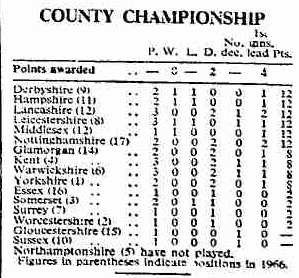After four days in which they had made it onto the field for
a total of one hour Kent had a stellar third day at Bradford, skittling the
champions for 40. Peter West, there for The
Times, was a Kent supporter so would have enjoyed recording the carnage.
Cowdrey’s declaration at 93 for four was made in the hope
of repeating the first-innings rout, but drying pitches lose their spite
quickly, so it was easy enough for the champions to save the draw, if not their
dignity. How The gnarly Yorkshire pros would have hated that happening against
the jazz hats of Kent more than anyone else.
Geoff Boycott’s pair was the only one he suffered during
his long career. It was Norman Graham who got him both times. Given his chance
in the first game of the season at Trent Bridge, by the end of this match he had
taken 15 wickets in not much more than three innings, securing the position of
first-choice opening bowler, one that he held for the next decade.
There was another close finish at Taunton, with Somerset
left 12 short with one wicket left. There was no requirement in 1967 that a
certain number of overs be bowled in the last hour, let alone the day as a
whole; it was all on the clock. Here, and elsewhere as the season went on, there
were accusations of time wasting. Carlton Forbes took so long to bowl the
penultimate over, that it became the ultimate, though as John Woodcock writes,
this was as likely to have cost his side the match as it was the opposition:
It was almost as close Between Essex and Glamorgan at
Chelmsford, where Rodney Cass (who later moved to Worcestershire) played out
Don Shepherd’s last over to secure a draw with one wicket left and 16 needed.
At the Oval, there was a third exciting draw. Surrey were 28 short with two
standing against Warwickshire.
Leicestershire and Middlesex both won and were two of six
counties with 12 points at the top of the table.
The more you look at the news of 1967, the more you see
contemporary parallels. Prime minister Harold Wilson committed the Government
to seeking entry into the Common Market, as the EU was then known. He opened a
Commons debate on the issue with a speech that he told Dick Crossman was “Gladstonian
length and consistency”. It didn’t match the five and six-hour duration of the
Grand Old Man’s budget speeches, but was 90 minutes long, which would be
unthinkable these days. The headline that I tweeted included a promise from
Wilson that Brentry wouldn’t lead to devaluation of the pound. Within six
months he was back on television announcing devaluation in his famous “pound in
your pocket” broadcast, which started the subsidence of the currency that has
peaked since the 2016 referendum.





No comments:
Post a Comment